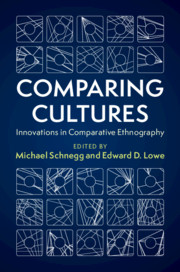Crossref Citations
This Book has been
cited by the following publications. This list is generated based on data provided by Crossref.
Wutich, Amber
Beresford, Melissa
SturtzSreetharan, Cindi
Brewis, Alexandra
Trainer, Sarah
and
Hardin, Jessica
2021.
Metatheme Analysis: A Qualitative Method for Cross-Cultural Research.
International Journal of Qualitative Methods,
Vol. 20,
Issue. ,
Schnegg, Michael
O’Brian, Coral Iris
and
Sievert, Inga Janina
2021.
It’s Our Fault: A Global Comparison of Different Ways of Explaining Climate Change.
Human Ecology,
Vol. 49,
Issue. 3,
p.
327.
Lenhard, Johannes
Margetts, Megan
and
Meng, Eana
2023.
Of not passing: homelessness, addiction, mental health and care during COVID-19.
Medical Humanities,
Vol. 49,
Issue. 1,
p.
55.
Schnegg, Michael
2023.
Becoming a Debtor to Eat: The Transformation of Food Sharing in Namibia.
Ethnos,
Vol. 88,
Issue. 2,
p.
392.
Gänger, Stefanie
and
Osterhammel, Jürgen
2024.
Rethinking Global History.
p.
1.
Günel, Gökçe
and
Watanabe, Chika
2024.
Patchwork ethnography.
American Ethnologist,
Vol. 51,
Issue. 1,
p.
131.
Simoni, Valerio
Voirol, Jérémie
and
Hjalmarson, Elise
2024.
Comparative moves: the pursuit of value and belonging in transnational migration toward a “better life”.
Ethnic and Racial Studies,
p.
1.
Greenberg, Michael R.
and
Schneider, Dona
2024.
Income disparities and risk: Geographical manifestations of extreme inequities in the United States.
Risk Analysis,
Greschke, Heike
2024.
“Positioning” Analysis With Autoethnography—Epistemic Explorations of Self-Reflexivity: Introduction to the Special Issue.
Qualitative Inquiry,
Vol. 30,
Issue. 8-9,
p.
659.



